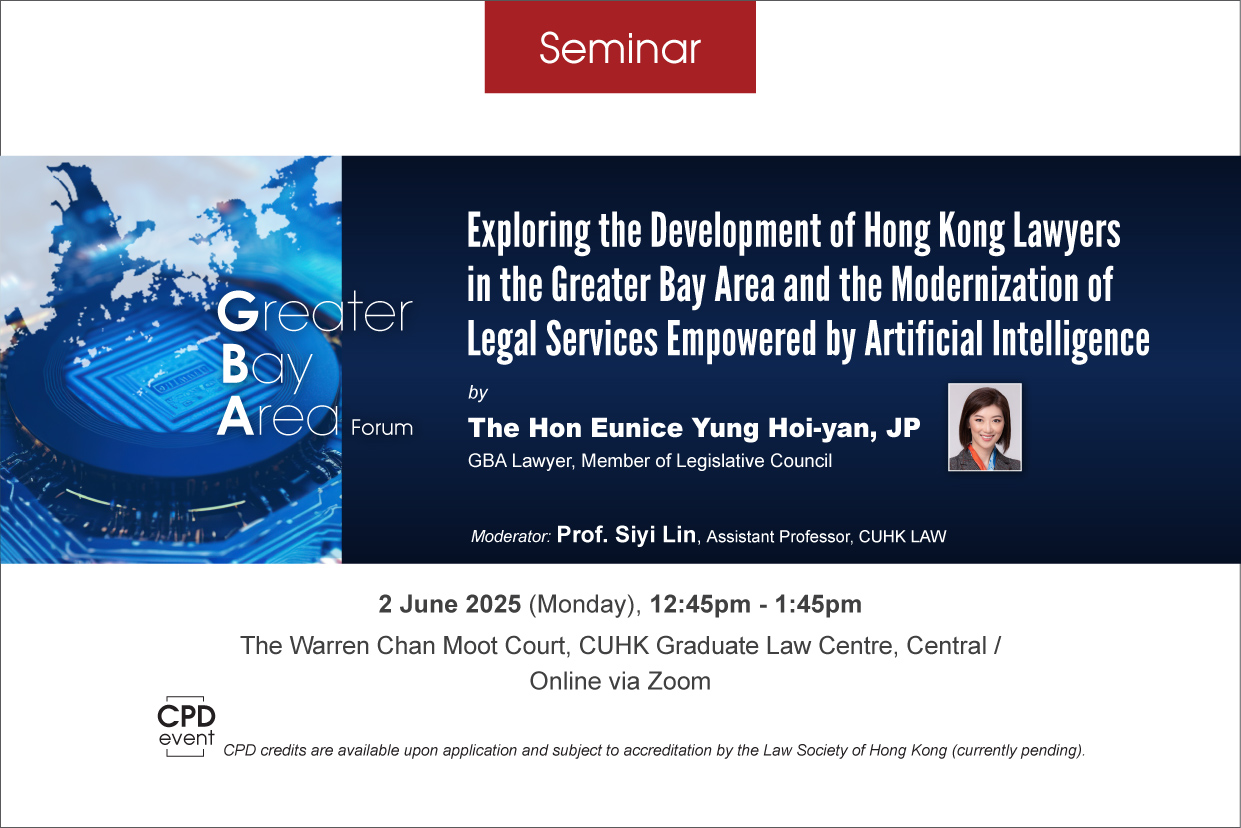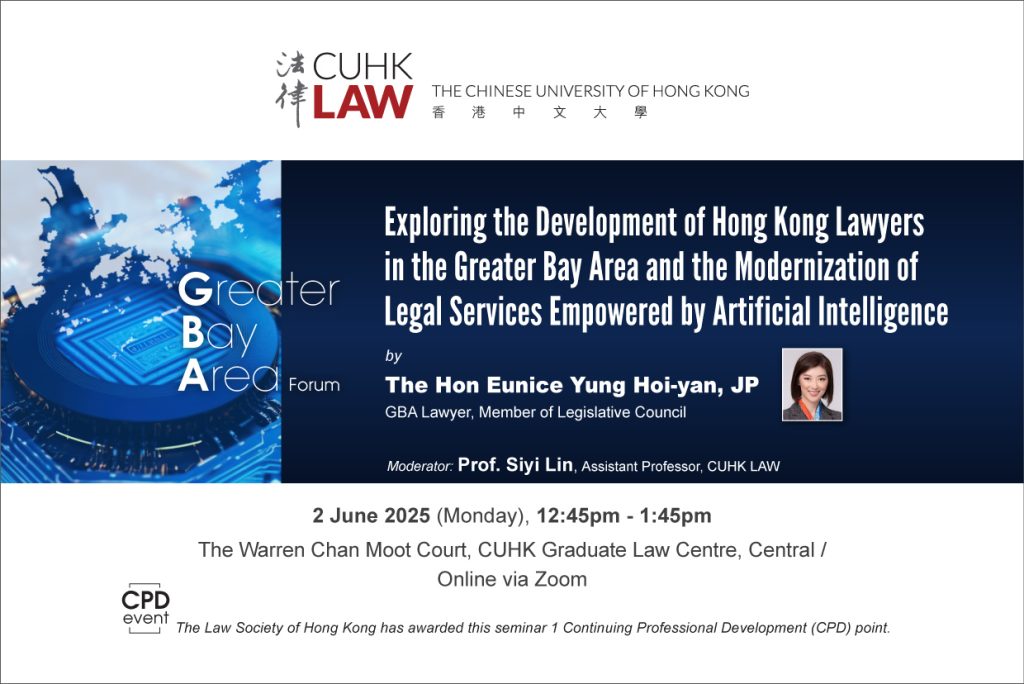
CUHK LAW GBA Forum 2025 Seminar – ‘Exploring the Development of Hong Kong Lawyers in the Greater Bay Area and the Modernization of Legal Services Empowered by Artificial Intelligence’

CUHK LAW GBA Forum 2025 Seminar – ‘Exploring the Development of Hong Kong Lawyers in the Greater Bay Area and the Modernization of Legal Services Empowered by Artificial Intelligence’
Is there a law of tort or only a law of torts? Two of the most, if not the two most, highly regarded writers on tortious liability differed on that question. Sir John Salmond maintained that outside a number of specific torts, no tortious liability exists. His view is that there is only a law of torts. Sir Percy Winfield maintained that it is a tort to cause harm to other persons in the absence of any legal justification or excuse. His view is that there is a law of tort. Trying to harmonize the two views is worthwhile. The effort alone would enhance our understanding of the law of tortious liability, our ability to apply it and our capacity to participate in its development. There is no wholly satisfactory definition of “tort”. An informative answer to the question “What is tort?” can begin by saying that there is such a thing as the law of tort, and continue by giving examples and illustrations, referring to the operation of specific torts. Such an answer spares a thought for the Salmond view while embracing the Winfield view. Remedying injury due to mischief is the motif. Common law tort’s history is long, although not nearly as long as Chinese tort law’s history. Tort law is essentially judge-made. There is some overlap between tort and crime and between tort and breach of contract. While primarily compensatory, tort damages can also be vindicatory and/or deterrent. Judges have said so with reference to various torts. In stating what is essential to an action in tort, judges have often done so in ways supportive of the Winfield view. To understand common law tortious liability, it helps to look at it together with comparable liability under Islamic jurisprudence and codes like the Corpus Juris Civilis and the Code Napoleon. When different torts clash, a “neutral umpire” is needed, and to found in something wider than the different torts in the contest. Governed by generalities, tort law accommodates specificities. We can accept Winfield’s view while seeing Salmond’s point. Law must keep pace with the times. To that forward-looking purpose, Winfield’s thinking seems better suited than Salmond’s.
With the deepening of the “One Country, Two Systems” policy, Hong Kong has increasingly become an important bridge for legal exchanges between China and the world. This seminar aims to discuss how Hong Kong lawyers can leverage their advantages in the Greater Bay Area, particularly in providing arbitration and mediation services for the growing number of cross-border disputes, creating new opportunities for collaboration between Hong Kong and Greater Bay Area lawyers.
Additionally, the rapid development of artificial intelligence (AI) technology in the current legal environment offers new possibilities for the modernization of legal services. AI is not intended to replace lawyers, but to empower legal professionals, enabling them to provide more efficient and precise legal services. The seminar will analyze how to harness the power of technology, allowing Hong Kong to play a greater role in promoting cross-border cooperation and legal tech innovation.
We will explore Hong Kong’s role in the global legal tech development landscape and demonstrate how to capitalize on its strengths to integrate with national development opportunities. Ultimately, the seminar will emphasize the importance of Hong Kong as an international legal center.
We look forward to the participation of professionals from various sectors in this seminar to jointly explore innovative directions for future legal services and establish a closer legal cooperation network.
About the Speaker:
The Honourable Eunice Yung, JP, obtained a Juris Doctor and a Postgraduate Certificate in Laws from the City University of Hong Kong. Hon Yung has been practicing as a barrister in Hong Kong since 2008. Hon Yung has also been a practicing Guangdong-Hong Kong-Macao Greater Bay Area Lawyer since 2022 with King & Wood Mallesons (Guangzhou). Hon Yung has been a member of the Legislative Council since 2016, representing the New Territories East constituency. Hon Yung was re-elected as a member of the Legislative Council in 2021, representing the Election Committee constituency. In the council, she is now serving as the Deputy Chairman of the Legislative Council Panel on Administration of Justice and Legal Services. Hon Yung holds a Bachelor of Science degree majoring in Computer Science from the University of British Columbia, Canada. Hon Yung worked as a research assistant at the University of British Columbia, Canada, focusing on big data analysis and library information management. Hon Yung is a Community Relations Director of China Resources Building Materials Technology Holdings Limited and a member of the board of directors of the Science Park Corporation.
Moreover, Hon Yung is a member of the ICAC Complaints Committee, member of the Lantau Development Advisory Committee, member of the Committee on Innovation, Technology and Industry Development and council member of Tung Wah College. Hon Yung is currently a member of the Shanghai Committee of the Chinese People’s Political Consultative Conference.
*The Law Society of Hong Kong has awarded this seminar 1 Continuing Professional Development (CPD) point.
Date
- 02 Jun 2025
- Expired!
Time
- 12:45 pm - 1:45 pm
Location
- The CUHK Graduate Law Centre
- Graduate Law Centre 2/F, Bank of America Tower, 12 Harcourt Road Central, Hong Kong
0 Comments